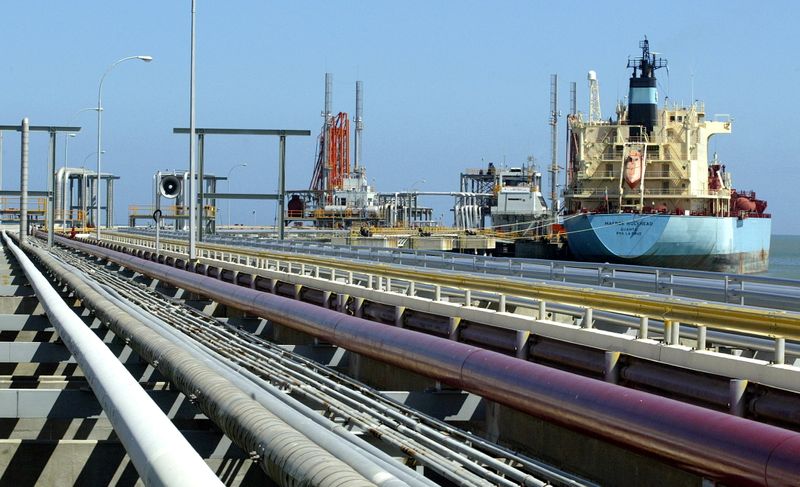
© Reuters. FILE PHOTO: An oil tanker is seen at Jose refinery cargo terminal in Venezuela in this undated file photo/File Photo
2/2
By Chen Aizhu, Mei Mei Chu and Marianna Parraga
SINGAPORE/KUALA LUMPUR/MEXICO CITY (Reuters) – Traders are racing to deliver record volumes of Venezuelan masked as Malaysian bitumen blend to China, ahead of new fuel taxes that look set to upend the lucrative flow of sanctioned oil to the world’s top crude importer.
China has over the past 12 months bought an estimated $3.5 billion worth of Venezuelan oil relabelled as Malaysian fuel, according to cargo tracking and industry sources, throwing Caracas a vital lifeline while it grapples with a collapsing economy amid tough U.S. sanctions.
Much of it has come in as bitumen blend, a mix of tar-like heavy crudes and refinery residue fuels that doesn’t attract consumption tax like fuel oil and also isn’t subject to China’s quotas on oil imports.
Bitumen blend shipments to China have jumped 13-fold since May 2020 with cargo-tracking specialist Vortexa Analytics estimating that 90% of the cargoes over the past year to end-April were actually heavy oil from Venezuela. That’s some 324,000 barrels per day (bpd), or nearly 61% of Venezuela’s total oil exports.
New fuel taxes that kick in on June 12, however, will increase the cost of bitumen blend to importers by 40% to 50%, making it uneconomic and choking off flows.
Graphic – China’s imports of Malaysian bitumen blend and crude oil: https://fingfx.thomsonreuters.com/gfx/ce/nmovaenlmva/China%20imports%20of%20Malaysian%20bitumen%20blend%20and%20crude%20oil.jpg
“While not all of the 350,000 to 400,000 bpd of the additional bitumen flowing into China will disappear overnight, a large proportion of it will be at risk,” said Liu Yuntao, China analyst at consultancy Energy Aspects.
Chinese customs declined comment. China’s foreign ministry and Malaysia’s trade ministry did not respond to requests for comment. Venezuela’s oil ministry and state oil company PDVSA did not immediately respond to requests for comment.
DESTINATION SHANDONG
Top Chinese state oil buyer CNPC stopped loading Venezuelan oil from August 2019 due to U.S. sanctions, but private traders and refiners have been willing buyers, re-certifying and blending the oil as Malaysian following transshipments in Malaysian waters, according to data and industry sources.
Some Venezuelan oil has been relabelled as Malaysian by branding it as Singma or Mal Blend crudes, while some smaller refiners, facing crude oil import quota restrictions, have looked for a feedstock that requires no import quotas, say industry sources. https://reut.rs/3echHtD
“Bitumen blend fits perfectly into that category,” said a Chinese trader involved in the business, who requested anonymity due to the sensitivity of the subject.
Demand has been fuelled by a strong recovery in Chinese consumption from the coronavirus slump since April 2020, and as the cut-off date for the new tax looms, imports have surged.
Vortexa Analytics estimated a record 4.3 million tonnes of Malaysian bitumen blend arrived in China in May, of which 2.7 million tonnes had been discharged by May 24.
That beats a previous record last December of 2.38 million tonnes reported by Chinese customs, and a pre-sanction high of 2.36 million tonnes for official Venezuelan crude in September 2016.
Zhou Mi, analyst with consultancy JLC, said around 2.4 million tonnes of Malaysian bitumen blend had been due to enter east China’s Shandong province in May, China’s independent refinery hub.
“Traders were scrambling to clear the cargoes before June,” said Emma Li, Vortexa’s China oil analyst.
Some diverted cargoes to northeast China’s Liaoning, another regular but less congested receiving area for these fuels, Li added.
China, which also takes oil from Iran, called on the United States last December to lift the sanctions on Venezuela, and has not taken any obvious measures to crack down on suspected imports from the South American nation.
Graphic – Oil tanker traffic off the coast of Shandong, China: https://fingfx.thomsonreuters.com/gfx/ce/xegpbrkgqpq/OilTankersShandong.png
THIN DISGUISE
In total, Chinese customs data showed China imported 24.5 million tonnes of Malaysian crude oil plus bitumen blend over 2019 and 2020, or 220,000 bpd.
However, these volumes far exceeded Malaysia’s official crude oil exports to China. Malaysia External Trade Development Corp data shows the country exported an average of just 9,000 bpd of crude to China during that two-year period.
Graphic – China’s imports of Malaysian crude oil – two sets of data: https://fingfx.thomsonreuters.com/gfx/ce/yzdvxmonopx/Malaysian%20crude%20to%20China%20-%20two%20sets%20of%20data.jpg
Traders said oil assays also showed that Malaysian bitumen blend currently being imported to China shares key chemical features with Venezuela’s flagship export grade Merey 16, including density, asphaltene, and sulphur content.
Malaysia produces only light, low-sulphur oils that are among “the world’s most expensive”, said a Malaysian oil industry official. Bitumen blend and Mal Blend, in contrast, are sold at deep discounts to global benchmark .
NEW NORMAL
With the new fuel tax starting on June 12, imports of Malaysian bitumen blend will face an extra $32 a barrel charge, making it largely uneconomic for processing, traders said.
Graphic – China’s official imports of Venezuelan crude oil: https://fingfx.thomsonreuters.com/gfx/ce/gjnvwmexxvw/China%20official%20crude%20oil%20imports%20from%20Venezuela.jpg
However, the impact on Venezuela’s overall imports to China is not yet certain.
Importers may be forced to return to labelling Venezuelan fuel as crude blends, provided they possess or can acquire the required import quotas, traders said.
In Venezuela, some traders and shippers expressed concern over how the new tax will be implemented.
But loadings of Venezuelan oil bound for Asia have not stopped, even for those cargoes that will not make it by June 12, suggesting that charterers might try to declare most of them as crude blends, rather than bitumen mix, shipping sources said.
“The tax is simply impossible to pay. They will have to find a way around it,” one shipper said.
($1 = 6.4730 renminbi)




